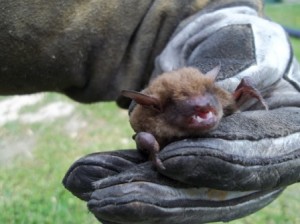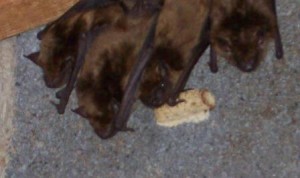BATS: Brought to you by Tri-State Wildlife Management, Cincinnati’s Experts in Bat Removal, Exclusion, and Repair (513) 853-0037
Bats Series Part 1: Synopsis and Biology Tri-State Wildlife Management continues to receive many calls from people in the Tri-State area who are realizing bats are taking up residence in their home or business. This is the time of year when the technicians at TSWM begin the preliminary bat exclusion process so when final exclusion is permitted, the job is completed more quickly and easily.
Due to the large number of bat encounters this time of year, Tri-State Wildlife Management will be posting a blog series devoted solely to educating the public about bats. The first part in this series gives a brief synopsis as well as bat biology information.
Bat Synopsis Bats may be the most misunderstood animals in the United States despite their ecological value. Regardless of their usefulness as the primary predators of night flying insects such as mosquitoes, bats suffer from a bad public image throughout much of the world. Centuries of myths, superstitions and misconceptions lead to fears of dread associated with such characters as Count Dracula and lead to bats being killed simply because they live near people that fear them. Despite their reputation, bats are not aggressive and usually wish to avoid humans. Bat populations the world over are rapidly declining leading to strict implementation of conservation efforts to protect bats and their habitats.
Biology Bats are mammals, having hair, giving birth to living young, and feeding them on milk from mammary glands. They are the only mammals that truly fly and are often seen fluttering around dusk, using their amazingly developed echolocation system (or sonar) to navigate through the night sky and locate and capture insects. More than two-thirds of bat species hunt insects in this way. It is said that a single little brown bat can eat up to 1,000 mosquito-sized insects in one hour, while a pregnant or lactating female has a large enough appetite to eat the equivalent of her entire body weight in a single night.
There are over 900 species of bats around the world with the majority of them residing in the tropics. Bats are second only to rodents in numbers among mammals and comprise almost one-fourth of all mammal species. The Cincinnati Tri-State is home to only a fraction of these bats, with the most common being the little brown bat and the big brown bat.
Stay tuned for our next installment of the Bat Series – Disease












